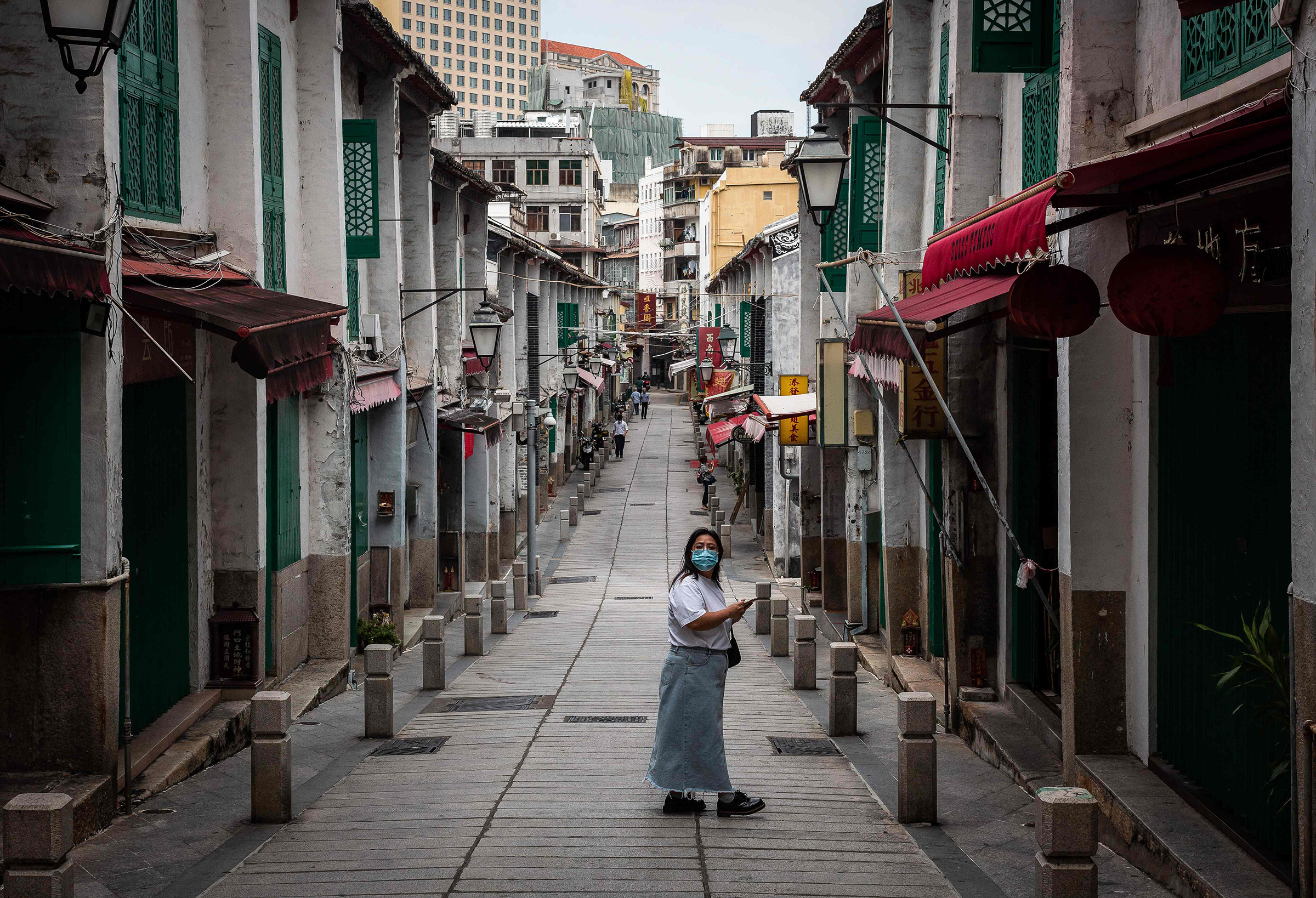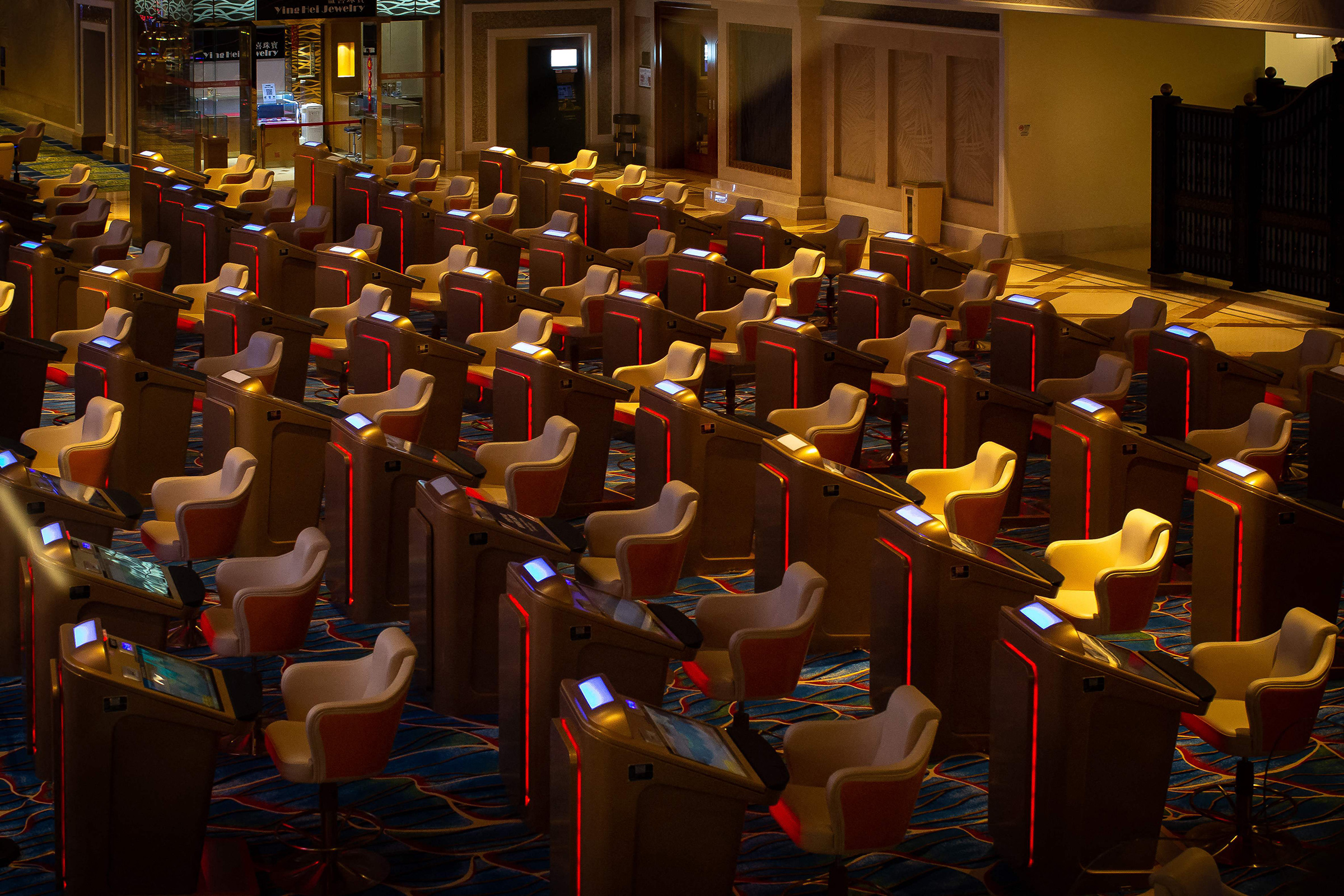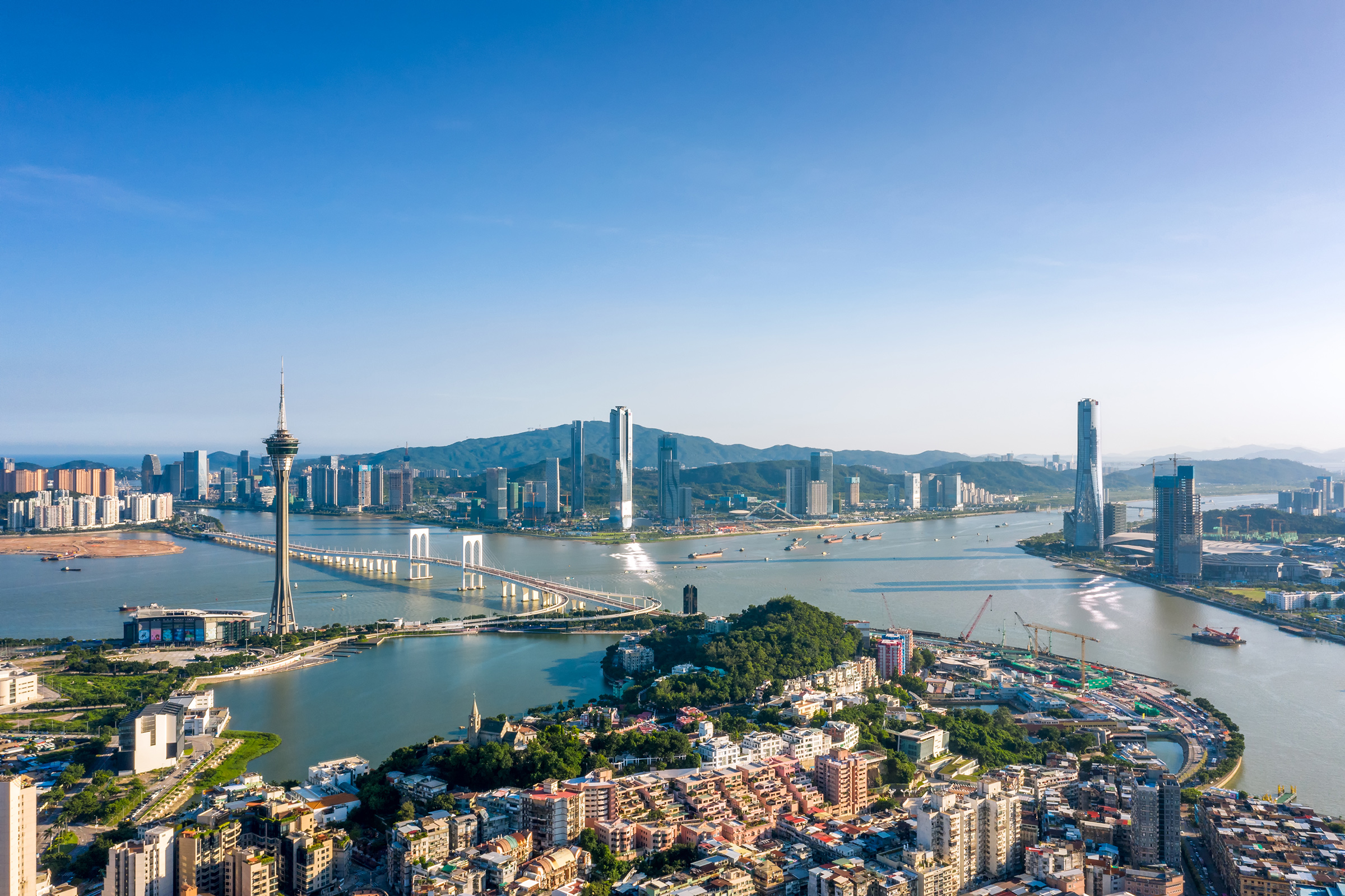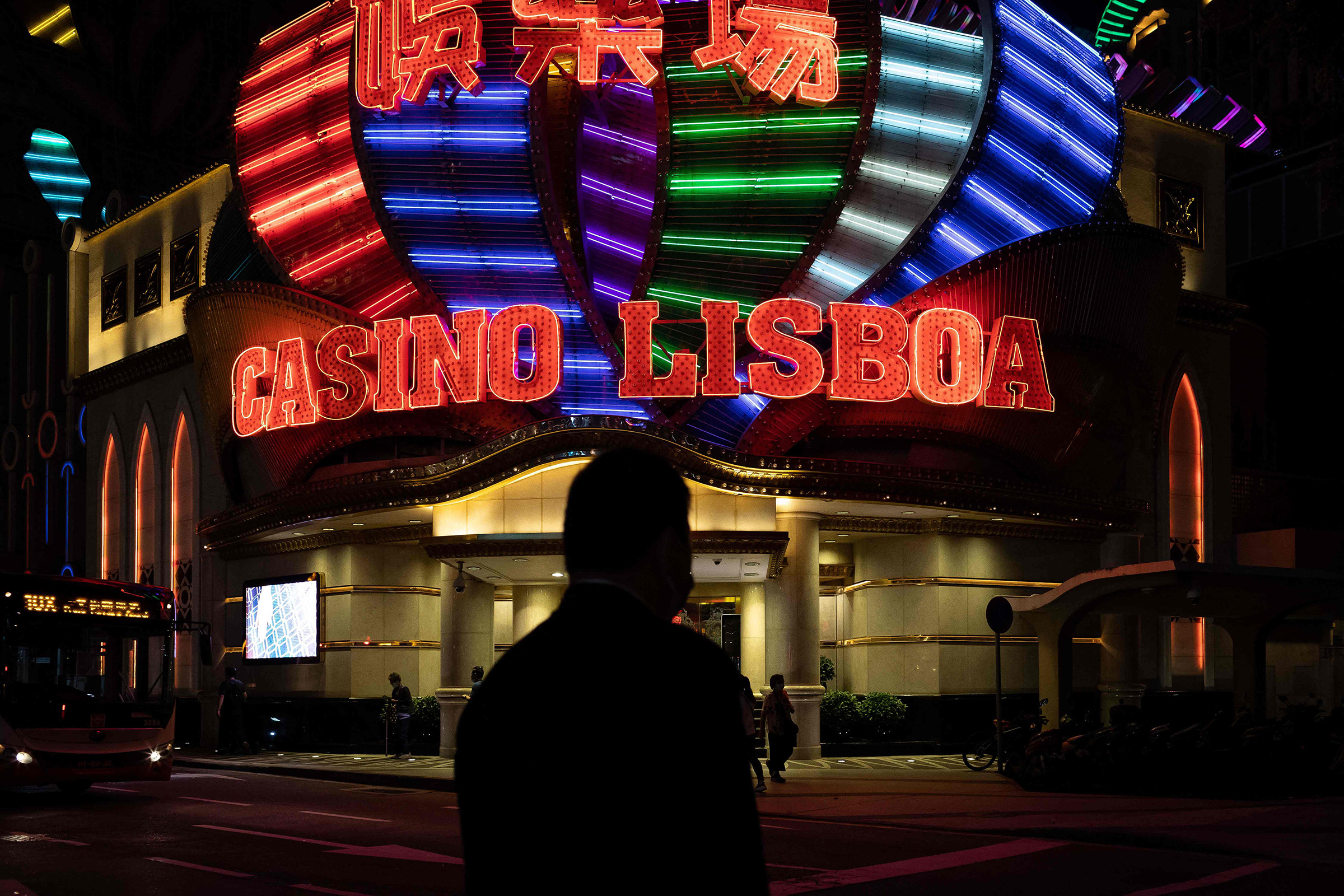
Although the lights are still on along the popular Cotai strip, the throngs of people that used to pour in and out of Macau’s many hotels and casinos are no longer there. In the gambling capital of the world, many tables today sit empty, with entire sections of some casinos completely closed off due to lack of business.
This transformation has upended the lives of Macau’s residents. Groove Kuok, 33, has not had a full-time job in months. For seven years, he worked at a firm operating VIP gaming rooms in the city, where he earned around 40,000 patacas ($5,000) a month by analyzing clientele’s win rates. But last December, the company announced via WeChat that it was ceasing operations immediately. “It was out of the blue,” he tells TIME.
Kuok has taken a few side gigs, but now he’s attending IT skills courses to try to improve his chances of getting hired in an increasingly grim local job market: the percentage of unemployed residents has steadily increased to 5.5% from a pre-pandemic rate of 1.8%. He’s considering leaving Macau, as many others have already done in the last year, in search of work in other places in the Greater Bay Area—a sprawling southern Chinese conurbation comprised of nine major cities in the Guangdong province as well as the special administrative regions of Hong Kong and Macau—to be able to support his younger brother and mother.

COVID-19 battered the entire world’s economy, particularly places dependent on tourism. Macau, a popular gambling destination commonly referred to as “the Las Vegas of the East,” invited some 39 million visitors in 2019, including Chinese high-rollers. But Beijing’s harsh pandemic border entry and exit measures dashed Macau’s tourist figures to just 5.8 million in 2020, and a new push to diversify the semi-autonomous Chinese region’s economy away from gambling has not helped it to bounce back.
Read More: The Rising Costs of China’s Zero-COVID Policy
With gaming accounting for 80% of Macau’s tax revenue, China’s double whammy of an ongoing zero-COVID policy and a tighter regulatory grip on the local gambling industry has locals and experts worrying that the Macau that emerges from the pandemic may be a shadow of its former self.
Gambling is in Macau’s ‘DNA’
For a city occupying a tenth of Las Vegas’ land area at 32 sq. km. with only around 680,000 residents, Macau generated revenues six times that of America’s gambling capital before the pandemic. In 2019, it brought in $36 billion. Today, the industry’s monthly revenues are down to $300 million, compared to Vegas’ $659 million.
The former Portuguese colony’s history with gaming dates back to its founding as a trading post in the 16th century. Chinese immigrant laborers gambled as a pastime, with makeshift stalls for fan-tan occupying the city streets. Due to the popularity of gambling among workers, by 1847, Macau’s Portuguese government officially legalized gaming and taxed its revenues.
More from TIME
Macau’s gaming landscape boomed after Portugal retroceded it to Chinese rule in 1999. In 2002, the city freed up its gaming sector, opening the market to multinational companies such as MGM, Wynn and Las Vegas Sands. By 2006, Macau became the world’s largest gaming market.
Read More: Can Asia’s Gambling Industry Continue to Thrive?
But the region’s revenues have notoriously relied on China’s high-rolling betters, which, in some cases, include state officials. The city’s VIP gamers contribute more than 43% of the sector’s earnings, in large part through junket operators—middlemen who facilitate gambling for wealthy, Chinese punters. Junket operators can handle everything from their client’s luxury accommodation and travel to even offering loans to play with.
Gambling has been officially illegal in the mainland since 1949 but not in Macau, a fact that has helped shape the latter’s cultural identity while also complicating the relationship it has with Beijing. Macau’s junket model was left somewhat untouched until late 2012, when Xi Jinping became president of China. His administration launched a strict anti-corruption campaign that dissuaded casino profligates. Gambling revenues took a hit.
Read More: As Casino Revenues Plummet, What’s Next for Tiny Macau?
In 2020, Xi embarked on a push for “common prosperity”—a vague policymaking principle of egalitarianism that has been used to rein in how the country’s wealthiest make and spend their money. With gambling responsible for 1 trillion yuan ($147 billion) leaving China’s economy, the clampdown on Macau was only a matter of time.
Last November, police arrested Alvin Chau, head of the city’s biggest junket operator Suncity Group Holdings, on more than 200 charges involving illegally operating casinos, money laundering and running a criminal syndicate. The warrant seen by Financial Times reportedly ordered Chau’s arrest for “severely damaging the social order of the country.”
Hao Zhidong, a University of Macau professor emeritus who writes on the city’s history and culture, said Chau’s arrest is a big deal as it affects “the way gambling has always been done.”
Read More: Will Hong Kong’s Democracy Protests Spread to Its Close Neighbor Macau?
Chau’s arrest came shortly after the Macau government proposed to tighten laws for the city’s gaming industry. Since then, the government has banned all dedicated junket rooms in casinos. It also halved the duration of licenses doled out to casino operators from 20 years to 10 years—subject to review of their compliance with the contract every three years—and required said operators to invest in local talent as well as initiatives outside of gaming, like green technologies, finance or entertainment.
The work force has been decimated as a result, with non-resident workers, which typically make up a fifth of the region’s population, among the hardest hit.
“Gaming was practiced in Macau long before 1849 … so it’s in the DNA of the place,” says Andrew W. Scott, vice chairman and CEO of Inside Asian Gaming, a Macau-based gambling magazine. “And when that gets taken away,” he said, “it makes Macau, frankly, an empty shell of what it used to be.”
Economic diversification faces long odds
China has long pushed Macau to stop relying on gambling alone and diversify its income streams, but several factors stand in the way.
For one, given its limited size, the region has no space to host new businesses. In September 2021, China offered 106 sq. km. of land in Hengqin, an island thrice Macau’s size just across the river, to be jointly developed and managed by both Macau and Beijing in the hope that it will kickstart investment in industries unrelated to gaming (which won’t be allowed there), like metaverse technology and traditional Chinese medicine (TCM).

The existing talent pool of Macau isn’t equipped for economic diversification either. An IMF report points out that advanced economies like the U.S. have a larger skilled population. But in 2021, almost 45% of Macau’s employed were clerks and service and sales workers, while some 24% had low-skilled jobs. Only 18.5% are considered professionals and technicians, who are needed for developing the sci-tech and TCM industries.
Read More: China Plans to Turn Hong Kong and Macau Into a Silicon Valley Rival
In a case of mixed messaging, authorities say they want to attract “high-end” to “senior professional” overseas talent, who can help Macau branch out into other non-gaming industries. Under the investment residency scheme, foreign professionals may apply to live in the region if they can help diversify local industries or improve their competitiveness. Yet in 2021, only one of the 33 “managerial or technical personnel” applications was approved.
“We have not achieved anything remotely near diversification,” Ben Lee, founder of the iGamix gaming consultancy firm in Macau, says. “With this exodus of talent, our ability has been driven even more remote to that vision, not closer.”
The future of Asia’s gambling Mecca
All this won’t necessarily spell the end of gaming in Macau. Despite millions in losses, the city’s six gaming concessionaires—Las Vegas Sands, Sands China, Wynn Macau, Galaxy Entertainment, Melco Resorts and SJM Holdings—have no plans to leave soon. “They have already sunk their interest in Macau,” Lee says. “For them to try to get a new concession means less commitment [on] their part than somebody who would be totally coming in brand new.”
Hao, the professor emeritus, said Beijing’s encroachment may have put an end to the lucrative VIP gambling the city was known for, but mass-market table gaming can still generate sufficient earnings. Before the pandemic hit, table gaming and slots made more than 141.5 billion patacas ($17 billion) in revenue for Macau. That market is likely to get another boost, as Macau plans to resume group tours this month and China aims to issue e-visas for domestic travel there.
But the established six may need stronger commitment to show to the Macau government before their licenses expire at the end of the year. A seventh company linked to Malaysian multinational Genting Group, which currently does not operate in Macau, is also vying for one of the six operating licenses. Genting is led by billionaire Lim Kok Thay, and the conglomerate’s involvement in non-gaming industries and theme parks make it a valuable contender—in line with China’s push to diversify Macau’s economy.

And junkets aren’t totally obsolete, with 46 operators still licensed of which at least 37 were in operation as of March. The new gaming law imposes stiffer restrictions for them, but, for Hao, how these junket operators will continue is less a matter of law and more of how much risk people are willing to take to fill the VIP market vacuum they will leave unaddressed. The junkets that made Macau into what it is now may find a new boom underground. “When you have a policy from the central government, there is always a way to go around that policy,” Hao says.
China’s clampdown is pushing Macau’s gaming market to find new hubs in nearby Singapore and the Philippines. But it won’t be easy for Macau to make a new name for itself apart from gambling. With other bustling Chinese hubs like Shenzhen and Hong Kong already excelling in areas like technology, financial services and trade, Macau leaving its “problematic” yet differentiable and undeniably popular industry altogether is unlikely.
“They have to keep Macau’s gambling industry, there’s no doubt about that,” Hao says. “But they’re not going to advocate it or boast about it.”
More Must-Reads from TIME
- Cybersecurity Experts Are Sounding the Alarm on DOGE
- Meet the 2025 Women of the Year
- The Harsh Truth About Disability Inclusion
- Why Do More Young Adults Have Cancer?
- Colman Domingo Leads With Radical Love
- How to Get Better at Doing Things Alone
- Michelle Zauner Stares Down the Darkness
Contact us at letters@time.com